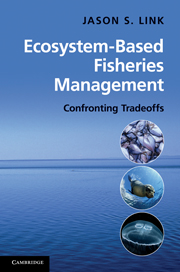Book contents
- Frontmatter
- Contents
- Preface
- Part I Context
- Part II Making EBFM operational: technical considerations
- 6 Ecosystem indicators
- 7 Expanding the stock focus: what we should have been doing yesterday
- 8 A systemic focus: what we can do now
- 9 Assessing risk: a different view of ecosystem information
- Part III Institutional considerations
- Glossary
- References
- Index
7 - Expanding the stock focus: what we should have been doing yesterday
Published online by Cambridge University Press: 05 June 2012
- Frontmatter
- Contents
- Preface
- Part I Context
- Part II Making EBFM operational: technical considerations
- 6 Ecosystem indicators
- 7 Expanding the stock focus: what we should have been doing yesterday
- 8 A systemic focus: what we can do now
- 9 Assessing risk: a different view of ecosystem information
- Part III Institutional considerations
- Glossary
- References
- Index
Summary
If you think you can or think you can't, you're right.
Henry Ford (attributed)LMR FOUNDATIONS
In the management of any biotic natural resource, it is critical to know how much of that resource exists and is expected to be produced in any given period of time. This is doubly so for LMR.
Hilborn and Mangel (1997) note the difficulties in estimating the abundance of LMR in the ocean, likening it to sampling small mammals in a field or forest from a helicopter by towing a butterfly net. The point here is that our surveying, sampling, and monitoring efforts are foundational in being able to assess the status of LMR, yet they have some inherent uncertainties. Entire tomes have been dedicated to that topic (e.g. Doubleday and Rivard1981; Murphy and Willis 1996; Anderson 2002; Smith 2002) and I won't repeat the details here. Suffice it to say that at the most basic level, we need a decent set of fisheries-independent and fisheries-dependent sampling in order to do either classical SS fisheries management or EBFM. The call for enhanced global ocean observing systems (IOOS 2007; GOOS 2007) should be one that is fully supported and engaged in by the fisheries community.
Equally critical to LMR management is understanding the key sources that enhance production (habitat, prey field, reproduction, growth, temperature optima, etc.) and cause mortality (fishing, predation, starvation, disease, etc.).
- Type
- Chapter
- Information
- Ecosystem-Based Fisheries ManagementConfronting Tradeoffs, pp. 88 - 109Publisher: Cambridge University PressPrint publication year: 2010



